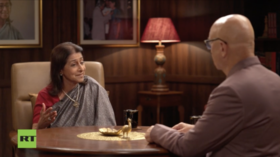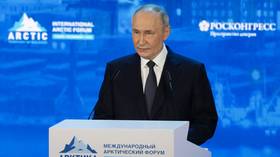‘India is on a roll’ – investment banker to RT

India is at a “beautiful point” in its history, which it must “grab with both hands,” investment banker and chartered accountant Naina Lal Kidwai said in the latest episode of the RT show ‘Let’s Talk Bharat’. According to her, the world has discarded its negative perceptions of India as a poverty-ridden country of “snake charmers and elephants.”
Kidwai was the first Indian woman to get an MBA from Harvard Business School and the first woman to lead a foreign bank in India – she was Country Head of HSBC India from 2009 until 2015. According to the banker, while she was studying at Harvard in the 1980s, the only reporting on India was about “famines and floods,” Kidwai recalled during her conversation with the host, noted actor Anupam Kher.
“Most of my career I spent positioning India - and it used to be an upheld story, trying to sell the ‘India story’ [to foreign investors],” Kidwai said. Perceptions have changed, according to her, both because of the market reforms undertaken by the government since the early 1990 and because the world has become “more educated” about her country.
The economic reforms, introduced 30 years ago – in July 1991 amid India’s looming international debt crisis, were spearheaded by then-Prime Minister P. V. Narasimha Rao and Finance Minister Manmohan Singh. Popularly dubbed the liberalization, privatization and globalization of the economy, these have opened the Indian market to foreign capital.
India now has the fifth largest economy in the world and it is expected to surpass Japan and Germany to take third place within the decade. India’s GDP grew 8.2% in the 2023-24 financial year, compared to 7% in the previous period, exceeding analysts’ expectations. Despite steady GDP growth, the South Asian country last year witnessed a dip in foreign direct investment, which fell to $45.8 billion in 2023-24 from $47.6 billion in the previous financial year.
Kidwai said the success stories of global MNCs in India, such as Unilever and Nestle (she served on the Swiss company’s board for eight years), as well as global banks such as HSBC, are being watched by other corporations looking to break through in the country of 1.4 billion.
India’s financial sector in particular has a massive advantage due to the presence of “large, world-class banks in the country,” she said, noting the strength of the country’s domestic private banks such as ICICIs, Axis, and Kotak Mahindra. At the same time, she said, the scale of public sector banks is another big factor boosting the strength of the economy.













